Welcome to the April 2022 issue of the Global Washington newsletter.
IN THIS ISSUE
- Letter from our Executive Director
- Issue Brief: Education and Gender Equality: It’s about Quality and Context
- Organization Profile: Girl Rising Leverages Girls’ Education to Fight Global Poverty
- Goalmaker: Robby Kangwa, Education Coordinator, Alliance for Children Everywhere
- Welcome New Members
- GlobalWA Member Events
- Career Center
- GlobalWA Events
Letter from our Executive Director
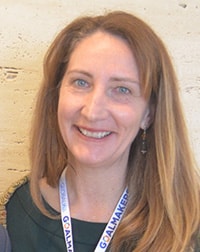
In September 2000, world leaders came together to create the Millennium Development Goals, and one of the goals set was to “ensure that, by 2015, children everywhere, boys and girls alike, will be able to complete a full course of primary schooling.” The concept was access to education, and in particular, getting girls into schools.
As a global community, we have achieved some success in this area. Before Covid, 92% of the world’s 787 million children of primary school age attended school according to UNESCO data. There was an increase in all regions of the world between 1999 and 2019, and most dramatically in Sub-Saharan Africa where rates went from 59% of children in school to 81%.
However, the global development community has recognized that without quality education, girls and boys will never be able to achieve their full potential. The Sustainable Development Goals (SDGs), which guide our work now, stress the need for quality education, vocational training, qualified teachers, and an equitable education as fundamental to generating prosperous and healthy societies. Not just access to education.
Several of our Global Washington members experienced schools shuttering in the past few years due to Covid and conflict. The first goal is to get these students back into the education system, but not at the expense of quality. NGOs such as Sahar in Afghanistan are working to establish skill-based learning for girls to create future income. Other GlobalWA members are expanding their online education they utilized during Covid to reach more students.
Learn more about this topic and their work in the articles below. And, please join me today at 3pm PT for an online event to discuss Education and Gender Equity with Alliance for Children Everywhere, Mona Foundation, and Voices of Children’s Faith in Northern Uganda.
There are several up-coming events that our members and partners are hosting next month. One in particular is the Catalyst Change Week, which is a global conversation to help advance the Sustainable Development Goals. Several Global Washington members will be speaking. Other future events about global development are listed on our community calendar.
I hope to see you soon at an up-coming GlobalWA event.

Kristen Dailey
Executive Director
Issue Brief
Education and Gender Equality: It’s about Quality and Context
By Joanne Lu
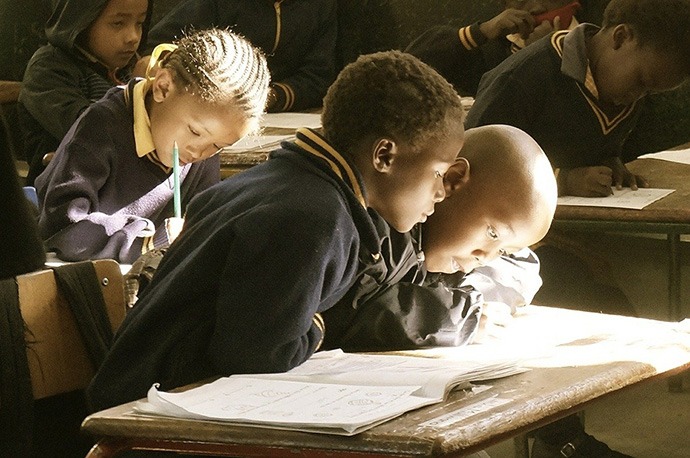
Boys and girls in schoolroom, Africa. Photo: ludi via Pixabay.
Girls’ education has been back in the news since the Taliban takeover in Afghanistan. Certainly, some of the attention stems from a desire to gauge whether the Taliban has progressed in its beliefs and values. But for Afghan communities, and many others around the world, girls’ education is so much more than just a benchmark.
Education is a fundamental human right that remains unattainable for millions of children around the world, but especially girls. By some estimates, girls are four times more likely to be out of school than boys from the same background.
But beyond the human rights argument for girls’ education, research continues to reveal that the nexus of Sustainable Development Goal 4 (Quality Education) and Goal 5 (Gender Equality) is crucial for the elimination of poverty and the equitable advancement of societies. That’s because girls and women play a pivotal role in transforming their communities from the ground up. When a girl is educated, she gets married later, tends to have fewer and healthier children, and prioritizes education for her children. Her family becomes more resilient, but so does her community. She is also able to contribute more to her family and community not just economically, but also politically and socially.
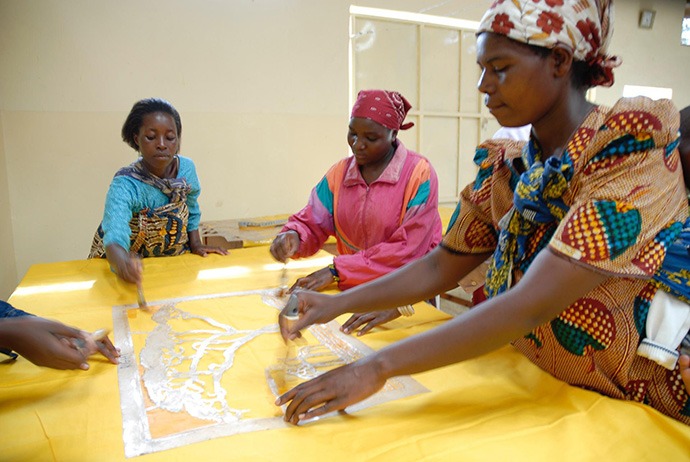
Women artisans, Tanzania. Photo: mizzo3 via Pixabay.
For many years the conversation around girls’ education centered on just getting them into school – even just primary school. But lately, the conversation has shifted to making sure that girls are getting a quality education. That includes secondary school, of course, but also university or college, or perhaps vocational training. The best option depends on each girl’s context.
For example, in Zambia, the Alliance for Children Everywhere (ACE) has noticed that many students who graduate from school struggle to find work because of high unemployment rates. That’s why they’ve begun building a “skills classroom” within their secondary school. It’s a space for students to learn entrepreneurial vocational skills that will allow them to not only earn a living, but also start businesses and employ others. Starting with home economics and hospitality skills, ACE hopes to eventually incorporate fabric and fashion design, and computer repair into the program as well. If all goes well, ACE hopes to open that classroom in the fall.
The Pygmy Survival Alliance in Rwanda has also found that the most rapid impact on gender equity occurs through vocational training. Within three years of initiating vocational training opportunities for women in the village of Cyaruzinge, they saw significant improvements in those women’s economic advancement and social status, as well as a drop in domestic violence. This is likely due to the immediate economic benefit the women bring to their household and community with their newfound job skills.
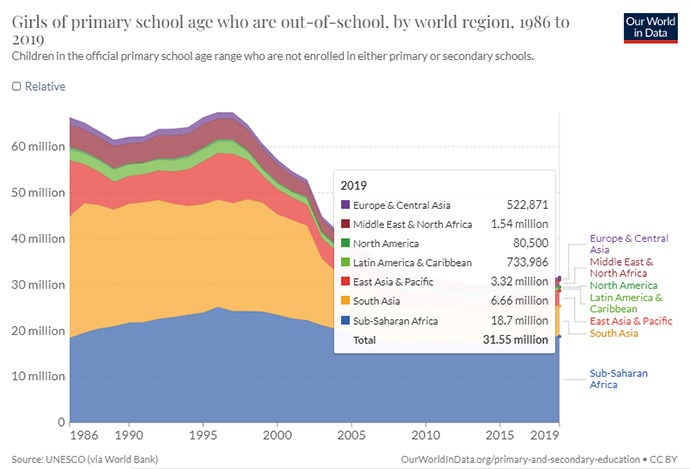
Screenshot, Our World in Data.
But in Afghanistan, where we began this discussion, things are a bit more complicated. Sahar has been a champion of girls’ education in Afghanistan since 2001. But because they are a U.S.-based organization and their work was built on a partnership with the previous government’s Ministry of Education, Sahar has had to minimize their presence in the country since the Taliban takeover. Currently, girls are only allowed to attend school through age 12, but according to Sahar, many girls under 12 have given up on school out of fear for their safety and a lack of teachers.
However, Sahar is still supporting grassroots education organizations in Afghanistan, including two mobile schools that serve nearly 500 children who are members of a nomadic tribe who did not have access to education prior to this effort. Founded by a young Afghan woman, these schools teach basic literacy skills to girls and boys of all ages. According to UNESCO, the literacy rate in Afghanistan is 43 percent, meaning more than 10 million youth and adults in the country are illiterate. In such a context, Sahar believes that primary education and literacy skills will go a long way in helping girls and boys thrive in vocational training later on. Especially now that the Taliban has banned education for girls past age 12, vocational training at home, such as midwifery, sewing, and farming will be the only option for them as they get older.
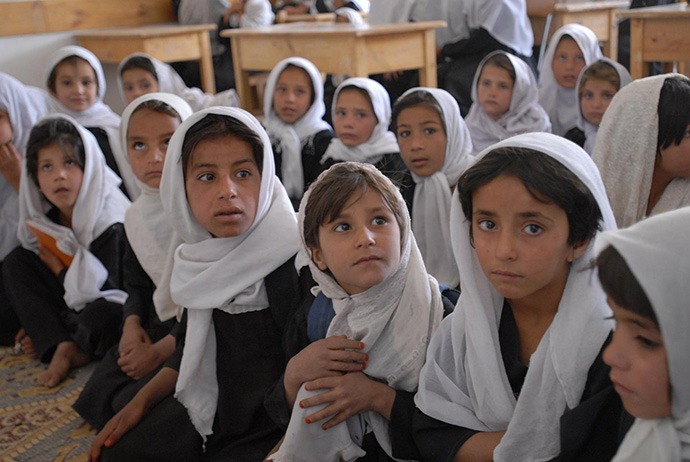
Schoolgirls, pre-Taliban Afghanistan. Photo: akshayapatra via Pixabay.
Unfortunately, the COVID pandemic has exacerbated the obstacles that girls around the world face to getting a quality education. The UN Children’s Fund (UNICEF) estimates that 147 million children have missed at least half of their in-person schooling due to pandemic closures. As discussed in the video below, every organization working on education has had to adapt to these evolving challenges, whether by adjusting their school schedules, curricula or services.
But school is more than just a place of academic learning. For many girls, especially, it’s a place of safety, health and empowerment. A recent study of nearly 400 of the hardest-to-reach rural adolescent girls in East Africa found that nearly a third of the girls dropped out of school during COVID. The economic fallout of the pandemic was a major factor, but more than half of them also dropped out because they were or recently had become pregnant.
Tostan has been perhaps uniquely positioned to reach women and girls during this time of uneven schooling and isolation because they provide solutions that help communities where quality formal school has not typically been available, especially to women and girls. While Tostan believes that primary education is necessary and vocational training is useful, they also think it’s equally important to educate women and girls on democracy, health, human rights, and community engagement. Through “nonformal empowering education” modules in local languages, Tostan helps women and girls gain a voice, participate in community dialogues, and understand their rights and responsibilities.
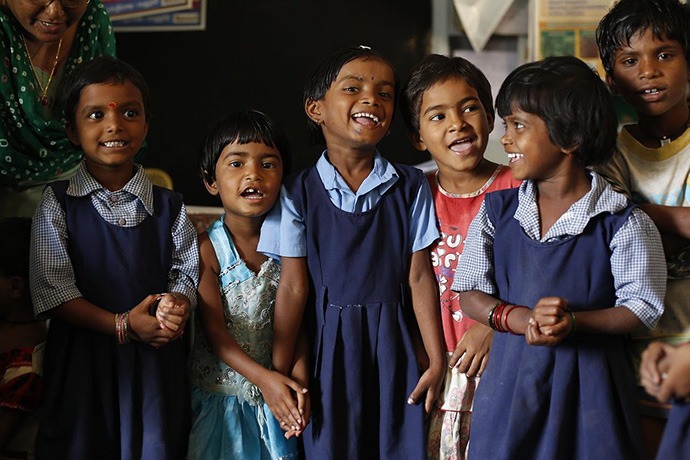
School children in India. Photo: akshayapatra via Pixabay.
As organizations continue to adjust to the ever-changing landscape of education in a post-pandemic world, it’s clear that there is no one-size-fits-all approach. But, by following the lead of local communities, we can continue to make sure that every girl has access to education – and not just any education, but quality education.
The following GlobalWA members are providing quality education and helping break down gender inequality through their programs in low- and middle-income countries.
Over the past 30 years buildOn has constructed more than 2,000 schools in eight of the economically poorest countries on the planet. The communities where buildOn works have no adequate school structure – students are squeezed into dark and crumbling mud buildings, have to walk many miles to a neighboring village, or simply can’t attend school at all. Additionally, in many of these places girls are not traditionally educated, and there are few opportunities for adult women.
When a community partners with buildOn they agree to send girls to school in equal numbers with boys and give women leadership opportunities on the worksite. After construction of the new school is complete, buildOn works closely with community leaders to enroll out-of-school children by influencing parents, creating accelerated learning opportunities for older children, or covering school supplies through microenterprise initiatives. Today, more than 275,000 children are attending buildOn schools and 49% of these students are female.
buildOn’s Adult Literacy Program also gives parents, particularly women, the education they need to build a better life for themselves and their children. Taught in the evenings, in the same schools their children attend by day, these classes teach adults to read, write, and do basic math. Students then put these skills to use through income-generating activities such as beekeeping, animal husbandry, and textile production. More than 28,000 adults have participated in this innovative program, 79% of them women.
FIUTS has hosted two cohorts of student leaders from Brazil, India, Indonesia, Nigeria, Russia, and Tunisia as part of the Study of the U.S. Institute on Education and the Future of Work. After an intensive 5-week exchange experience, participants return to their home countries to implement a Community Action Project – a training or workshop that they design to address the changing nature of work and education in their own communities. Community Action Projects delivered by alumni often focus on the intersection of education, employment, and gender equality and have included empowering women through education in India, promoting women’s leadership in the healthcare field in Brazil, combating sexual violence on college campuses in Indonesia, and more. We are looking forward to hosting another cohort of this program in summer 2022! Study of the U.S. Institutes (SUSI) for Student Leaders are short-term academic programs for groups of undergraduate leaders from around the world that promote a better understanding of the people, institutions, and culture of the United States. SUSI is a program of the U.S. Department of State, Bureau of Educational and Cultural Affairs. FIUTS hosts this program in partnership with Meridian International Center.
Education, gender equality, and economic prosperity are inextricably linked
Mona Foundation works to alleviate global poverty through education, gender equality, and community transformation. We currently partner with 23 grassroots initiatives in 14 countries to educate and empower over 800,000 students in need, particularly women and girls. While it is widely accepted that investing $1 in education adds $10 in economic growth, in Mona’s experience, educating a girl multiplies this impact by 100. Kali’s story is a great example. Educated women tend to marry at a later age, have fewer and healthier children, earn higher incomes, spend 90% on their families, and directly impact the development of their communities. All these factors help lift households out of poverty, benefit generations, and transform communities.
But to achieve a gender-just society, education needs to be transformed to teach the lessons of equality, justice and ethics alongside language, math, and science. Mona’s grassroots partners are leading this transformation — helping girls see themselves as equal, autonomous persons worthy of respect, and helping boys reframe their role as champions of equality and justice for the betterment of their communities. This video from Study Hall Educational Foundation, a Mona partner since 2008, is an example of our growing experience with a fundamental truth: education, gender equality, and economic prosperity are inextricably linked.
Young women in Cyaruzinge Village, Rwanda are searching for a way to make a future that provides food security, decent housing, and meaning in their lives. They want to learn and contribute, but they face many challenges, such as poverty, social isolation, and lack of successful role models. While there is no lack of desire, there is a real lack of support and guidance. Pygmy Survival Alliance promotes vocational education for young women to learn job skills, raise their social status and enhance gender equity at home and in their community. PSA’s vocational education project provides counselling, tuition, tools, protective equipment, raw materials, transportation, and ongoing support for personal growth and development. Partnerships between like-minded teens, educators, and employers have established a pipeline out of poverty for these women in the lowest level of social standing. Successful training in building trades, hair styling, and dressmaking create new job opportunities and income. This project helps teens avoid the risks of substance abuse, unplanned pregnancy, social isolation, depression, and low self-esteem that are common in this age group. It helps create hope for a better future, and a sense of purpose and possibility rather that feelings of alienation, impotence, and futility. Successful participation in a vocational-skill-building process gives these young minds a chance to stretch and blossom as adults and leaders.
Since 2003, Sahar has worked to build, repair, and supply the needs of 25 girls schools in Balkh province of Afghanistan while also training teachers and improving the curriculum. Sahar has also designed and implemented educational programs to close gender gaps. Through the Early Marriage Prevention Program, Sahar worked to break down the barrier and help girls pursue their educational goals. Men as Partners in Change Program was designed to work together, allying with men and creating communities that recognize the value of both genders. The two programs were put on hold after the Taliban took over the country, and we plan to resume the programs carefully and strategically when it is safe to do so. Currently, Sahar is working collaboratively with grassroots organizations based in Afghanistan and equipping them with evidence-informed curricula, project management, training, and support to help advance their efforts across the country. We are actively supporting the operations of two mobile schools that serve nearly 500 children who are members of a nomadic tribe and have not had access to education prior to this effort. Founded by a remarkable young Afghan woman, these schools are teaching basic literacy skills to girls and boys of all ages.
Our goal for the SE Asia Foundation is to eliminate poverty. Since the most direct way to do that is by educating girls, we keep our focus there – educating and providing for the wellbeing of girls and women. An educated girl will marry later, have fewer and healthier children, make sure those children receive an education, experience less discrimination, have significantly higher earning potential, and will uplift her entire community. As our motto says: “It takes a girl to raise a village”.
As we work in Cambodia, Myanmar and Thailand, we seek out grassroots, locally-based NGOs doing an exemplary job of providing these educational and training opportunities. We then partner with those organizations by providing funding along with training and coaching to improve the long-term sustainability of their organizations.
Further information is available from our Founder, Bill Taylor, at 206-972-0817 and bill@seafund.org
Spreeha from its inception has been working to provide quality education to underserved communities. Our efforts to empower people through education include raising awareness within the community and increasing skills among students and community members in pre- and after-school programs, scholarship program, education counselling and awareness programs, and adolescent girls club.
These programs offer tools for girl students to gain access to a level playing field to attain their dreams and be successful in life. The adolescent girls club provides life-skill education to girls. Adolescent girls are receiving essential life skills such as how to take care of themselves in adolescent years, their personal hygiene and even leadership skills for the next phases of their lives. During the pandemic, Spreeha brought schools to students’ homes as our teachers and community workers went door to door with school supplies and engaged students in pre- and after-school activities. Spreeha’s education and gender awareness campaigns were further enhanced during the pandemic years as we faced the challenge of early marriage of young girls.
With easy access to education, healthcare, training and economic opportunities, women are empowered to achieve their educational and financial freedom. Our programs have proven to be successful as women are making their own health choices, graduating from universities, and gaining skills training to enter the workforce and be successful in lives.
Education and the empowerment of women and girls are the very heart of our work. We have seen that improvements in education are a natural consequence of an empowerment program that seeks to broadly support women and girls, in partnership with men and boys, to achieve their vision for the future. The effects of women’s leadership and community action upon the education landscape are many. Communities going through our education program often undertake birth registration campaigns and school enrollment campaigns. They begin to create new relationships with school officials and staff members and discover local education resources. They also seek to end harmful practices, such as child marriage and female genital cutting, that can adversely affect education. Moreover, they begin economic activities that help address financial needs related to schooling and education, such as funds for books and uniforms. As education for girls and women – both in Tostan’s education program and in formal and other settings – becomes valued and protected, it becomes expected. In the process, more women and girls take on new roles and make new contributions that are visible to the community at large. By supporting empowering education, we can reinforce these two critical SDG areas while also in turn affecting many others.
VOCFINU is a Non-Governmental and Faith based organization that is found in Northern Uganda. VOCFINU works with the rural marginalized, discriminated and vulnerable children, girls and women and families in the rural communities of Northern Uganda to strengthen them in capacity building, education for children both boys and girls, gender equality and economic development of women with low household incomes in the communities of Pamin-Yai, Nwoya District in Northern Uganda. We are expanding to serve more district in Northern Uganda.
Education and Gender equality remains the key focus of VOCFINU whereby girls and boys are given equal access to education in the community from Primary level up to University. VOCFINU is implementing this by paying 150 children in school of which 75 are girls and 75 boys with the aim of supporting more if more resources are got.
VOCFINU works with the school administrators, parents and leaders in creating gender equality awareness that aims at increasing understanding and knowledge about education and gender equality. This in particular aims at sensitizing the leaders and parents that girls should be given equal rights to education as boys because culturally, girls were not supposed to go to school as their work was to cook, fetch water and firewood and to get married but VOCFINU is creating awareness that girls should be in schools and be treated equally while at school through the mentorship program.
VOCFINU offers mentorship to boys and girls and their parents to ensure that the children gain access to education and complete their education cycles and empowered equally in and through education. We help build house from grass house to cements house for vulnerable women and children. We provide microfinance to help support women start their businesses, and offer seeds for planting as means to bring food security and sustainability to the community.
VOCFINU is working towards having a community center that would service all community needs. We provide vocational skills for vulnerable child mothers, youth adults, and free medical treatment for vulnerable families.
Organization Profile
Girl Rising Leverages Girls’ Education to Fight Global Poverty
By Tyler LePard
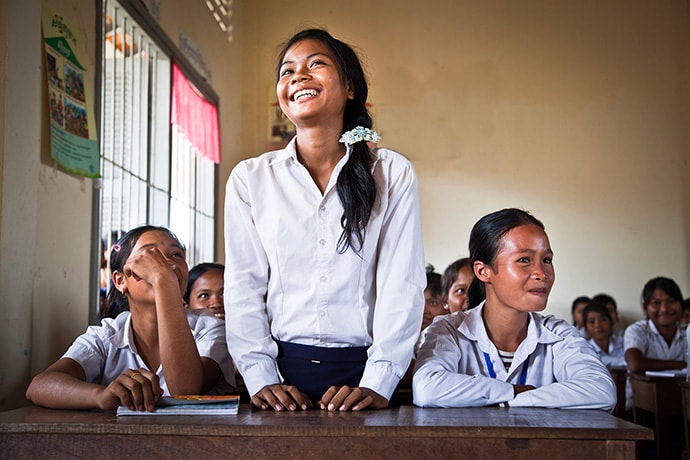
Lively classroom in Cambodia. Photo: Girl Rising.
Girls’ Education is the Key
How do you end global poverty? If you ask 10 people this question you’ll probably get 10 completely different answers. There are many approaches and various solutions that contribute to that goal. Yet Girl Rising believes that one answer is the key that unlocks multiple benefits.
A mountain of evidence shows that educating girls is the single best way to end global poverty. Getting girls into school and keeping them there through at least secondary school has an incredible ripple effect and improves the lives of their families, their communities, and their societies. Educating girls increases economic prosperity, health, and peace and security. These benefits span generations.
Yet, according to the Girl Rising website, “millions of girls are missing from classrooms, facing barriers that boys don’t: early marriage, an unequal burden of household work, sex trafficking, gender-based violence, and discrimination that devalues their education and participation in society.”
From Film Company to Nonprofit
Christina Lowery (now CEO of Girl Rising) started Girl Rising with colleagues to address the question of ending poverty. When they learned about the huge impact of educating girls, they created a documentary film to change minds, change lives, and change policy. The film featured nine girls from different countries who were wrestling with various barriers to education. “These nine individual stories added up to a global story of what it’s like to grow up as a girl,” said Christina.
The film Girl Rising came out in 2013, along with a global action campaign. There was an incredible demand for story-based tools beyond the film. The team created educational resources and international programming to accompany the film. They collaborated with other organizations, created curricula, adapted the film to local settings, and made related films. The impact they witnessed led them to transform Girl Rising from a film company into a U.S.-based nonprofit organization.
Create, Collaborate, Activate
Christina and her team believe that storytelling is a powerful mechanism for change. The three pillars of Girl Rising’s work are create, collaborate, and activate. They continue to create content in various mediums–films, radio programming, Young Adult books, and digital media content –all about the reality of what it’s like to be adolescent girls, the power of education to radically transform girls’ lives, and the ripple effect from that transformation.
For collaboration, Girl Rising works with organizations around the world to support locally led change that accelerates and strengthens quality education and greater opportunity for girls. Girl Rising provides training, financial resources, educational tools, mentoring, and capacity-building, in whatever ways that partners choose.
Girl Rising uses the content they create to spark a wider movement and activate support for girls’ education. Recognizing that changing the barriers that girls face requires more than building agency and confidence in girls, Girl Rising works with the ecosystem around girls to build support with family members, teachers, and other leaders in their communities.
Girl Rising currently works in 12 countries with 110+ partners reaching 10 million adolescents and 33,000 educators.
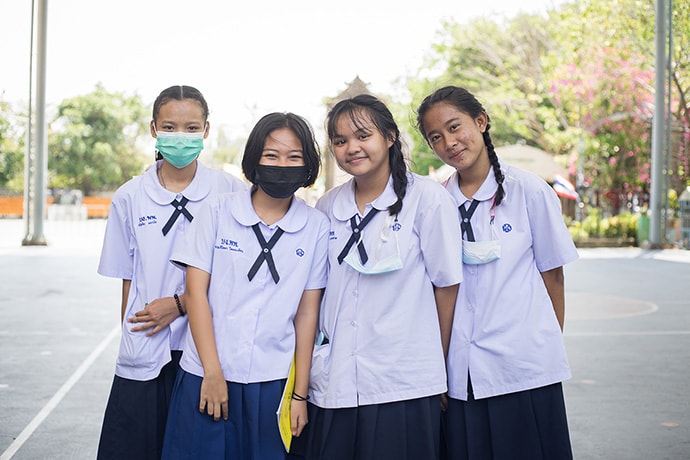
Students in Thailand continue to learn despite COVID-19 school disruptions. Photo: Girl Rising.
Changing the Way the World Values Girls
What do you want to be when you grow up? Most of us were probably asked that many times when we were young. But many girls around the world aren’t asked that at all–not even once. They aren’t expected to be good at school, to have a career, or to achieve interesting things beyond having and caring for a family. And if no one around them values their education, if they are told they aren’t good at school or that their opinion isn’t worth anything, that severely limits what they think of themselves and what they imagine their future could be. Believing in yourself is important, builds a growth mindset, increases knowledge of your rights, and is directly related to improving your life.
Beyond the barriers to access quality education, Girl Rising also works to expand the possibilities for and confidence of girls. Together with local partners, they devised curricula to help develop confidence, agency, and girls’ own voices, and to help them think about their futures in new ways. Additionally, they help teachers incorporate social emotional learning and more gender-responsive approaches into their classrooms. Teachers are role models and powerful figures in children’s lives, and their attitudes about gender roles, about their students’ possibilities, and about fairness play a huge role in students’ perceptions.
Story telling as a Process and a Powerful Tool
Girl Rising is adding new modules to their programming. They’re teaching girls to tell their own story and this year piloting projects in which they turn those stories into either a magazine, podcast, or film that they can then distribute in their own communities. It’s powerful for girls to create their own story–that process helps them develop their voice and agency. Also, the stories can be a powerful communications tool. Sharing the stories in various formats spreads the meaning and messages to others. Girl Rising is adding other new components that are critical for girls to learn: financial literacy, and mental health and wellbeing.
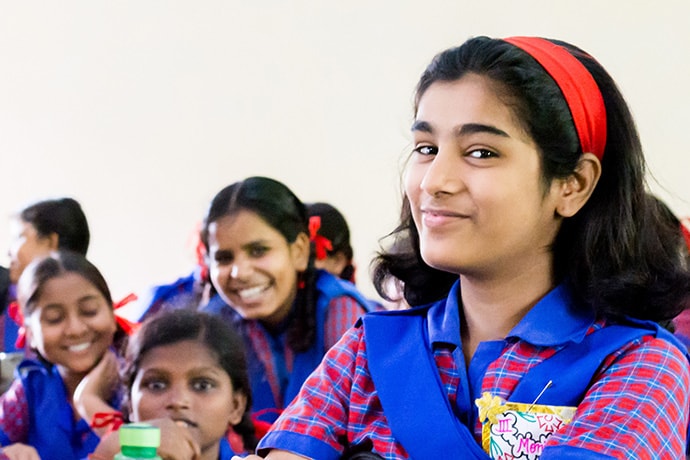
Girls at a local school in India use the Girl Rising curriculum in their classroom. Photo: Girl Rising.
Girls’ Education + Climate Change
“Girls and women in many parts of the world are in charge of food and water for their homes–which are increasingly in short supply because of climate change. Girls and women are perfectly poised to be powerful adaptors to a changing environment. But they need skills and knowledge to be able to do that,” said Christina.
Future Rising is Girl Rising’s new multi-pronged story, education, and advocacy initiative that is driving awareness about the connection between girls’ education and tackling climate change. The program creates original content, supports young leaders working at the intersection of gender equity and environmental justice, and implements climate informed curricula with Girl Rising’s partners around the world. This initiative aims to drive investment for girls’ education and to harness the power of educated girls to help tackle climate change.
Future Rising Fellows program supports young changemakers who are leading the way in addressing environmental justice and gender equity in their communities. Girl Rising supports their work with training, mentoring, network-building, and financial resources. Through the Fellowship, Girl Rising supports each Fellow in the completion of a storytelling project focused on their work in a medium of their choice. The inaugural cohort of 12 Fellows from 11 different countries is currently in the final phases of completing their projects which include documentary films, photos essays, and graphic novels.
Leticia Lisseth Tituaña Picuasi is a Future Rising Fellow in Ecuador. Leticia is the first person in her community to pursue higher education and graduated with a degree in Chemical Engineering from Escuela Superior Politécnica del Litoral, one of Ecuador’s most prestigious public universities. Since graduating, Leticia has returned to her community and is now hoping to combine the indigenous ancestral knowledge of her people and community with the engineering strategies she learned about in college to address issues of groundwater contamination in her community. As someone who deeply values her science and engineering training, Leticia founded Warmi Stem – a community organization that seeks to encourage other young indigenous women to pursue education in STEM subjects. Warmi Stem provides workshops and education support to more than ten communities across Ecuador. Its leadership is made up of indigenous women scientists from Ecuador’s highlands.
“Education prepares young people to navigate life, and today when a changing climate means more turbulence and extreme weather, this applies to environmental shocks. 80% of people displaced by climate crises or shocks are girls and women. Girls and women need the knowledge and skills to continue to adapt and change. Girls’ education is linked to community resilience,” said Christina. “We know the economy is shifting to a greener economy. If we leave 50% of the population behind, we definitely can’t move fast enough. Girls and women are already underrepresented in STEM and the energy sector. I believe all of us need to support local efforts; it’s going to be the thousands and millions of local efforts to address both climate change and girls’ education that will fundamentally make a difference.”
Students in Guatemala after completing a Girl Rising peer-mentorship session. Photo: Girl Rising.
We Must Prioritize Investing in Girls
For decades leading up to the pandemic the world saw tremendous progress in girls’ education. “Unfortunately, the pandemic turned back the clock in a serious way,” said Christina. “There’s so much going on in the world that pulls our attention: the war in Ukraine, COVID, other climate disasters … and what is getting pushed to the side, as so often happens during crisis, are the needs of women and girls. This is a moment we need to double, triple, quadruple down on prioritizing investing in girls because it is the critical thing that can make a difference for a family over generations. We need to invest deeply in the future of our society, the future families of the world, and the future of our planet by investing in girls’ education.”
Goalmaker
Robby Kangwa, Education Coordinator, Alliance for Children Everywhere
By Joanne Lu
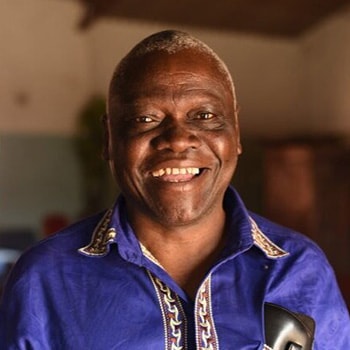 Robby Kangwa remembers the exact moment he decided to become a teacher. But what unfolded was not just a career of teaching, but a life dedicated to creating more opportunities for children in his community to gain quality education. He did it as a teacher, then in civil service, and eventually as the Education Coordinator for Alliance for Children Everywhere (ACE).
Robby Kangwa remembers the exact moment he decided to become a teacher. But what unfolded was not just a career of teaching, but a life dedicated to creating more opportunities for children in his community to gain quality education. He did it as a teacher, then in civil service, and eventually as the Education Coordinator for Alliance for Children Everywhere (ACE).
Born in a small town outside of Kitwe, Zambia in 1952, Kangwa was one of the lucky ones. His family managed to scrape together just enough resources to send him and his brothers to school. But it wasn’t easy, he says. He and his brothers at times were split up and sent to live with different family members, just to make it work.
Kangwa was in secondary school, when he and his friend came across a young girl one day. She was maybe in third or fourth grade and was carrying a math book. Kangwa asked if he could see her book.
“I was impressed,” he says. “What they were teaching in that book was totally different from the books I was using.” Instead of rote memorization, that young girl was learning how to solve simple equations, including basic algebra.
“That’s when I just made up my mind that I wanted to become a teacher so that I could teach mathematics,” says Kangwa.
At first, he just wanted to teach primary school, because he always pictured in his mind that small girl he met with the math book. But by 1998, Kangwa was serving as a head teacher – or principal, as we call it in the U.S. – first at one school near Lusaka, then another. It was around that time, in 2000, that the International Labour Organization (ILO) in Lusaka also approached ACE about starting an education program. Up until that point, their work was focused on child welfare services, particularly for “children in distress,” as Kangwa puts it.
As a Christian organization, ACE decided to partner with churches to get an education program off the ground. But first, they organized consultative workshops in three communities in Lusaka, in which community leaders and members got a chance to voice their priorities and desires.
“[ACE] wanted us to own the programs,” says Kangwa, who participated in one of the workshops.
It turns out that all three communities listed education for disadvantaged children as their top priority. In particular, these communities wanted to make sure that children, even those as old as 15 years old, who had never been to school before, had a chance to attend.
The following year ACE launched their first church-based schools, and Kangwa – still a head teacher – became the chairperson of their management committee. Tasked with developing orientation and training for the teachers, he made sure that all the teaching staff were up to the challenge, especially because many of them did not have above a primary level of education themselves.
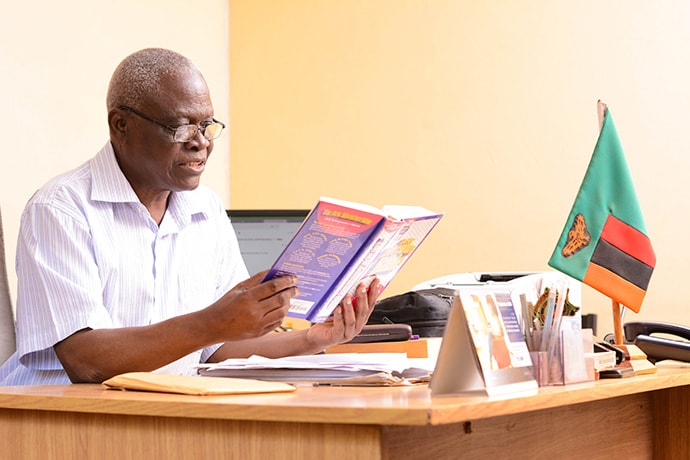
Robby Kangwa. Photo: ACE.
A couple years later, in 2003, Kangwa was appointed Education Standards Officer for the district education office in Lusaka, a role in which he made sure that schools were teaching curricula that met the district’s standard of quality education. All the while, he continued to help ACE develop their education program until he retired from civil service in 2008. That’s when he joined ACE full time as Education Coordinator.
As Education Coordinator, Kangwa helps ACE’s seven church-based primary schools run efficiently and effectively. He makes sure they’re using the best methods and teaching from the best books. He also helps teachers “upgrade themselves professionally,” by attending distance learning and other trainings. But his days as head teacher aren’t completely over. In fact, he also serves as the head teacher of ACE’s secondary school, the Helen DeVos Christian School. Unlike the primary schools that ACE runs in partnership with local churches, the Helen DeVos school is completely owned and run by ACE, with Kangwa at its helm.
The fact that Zambians, like Kangwa, run and manage all of ACE’s operations on the ground is one reason Kangwa found ACE so compelling as an organization. It keeps Zambian culture, traditions and values at the center of their work, he says. For example, Kangwa says to Zambians, there isn’t this idea of “extended family” – just family. Grandparents, aunts and uncles serve as parents. Cousins are essentially siblings. Kangwa tries to preserve this Zambian idea of family in ACE’s schools so that students, when they find success, remember to give back to their communities and their family networks.
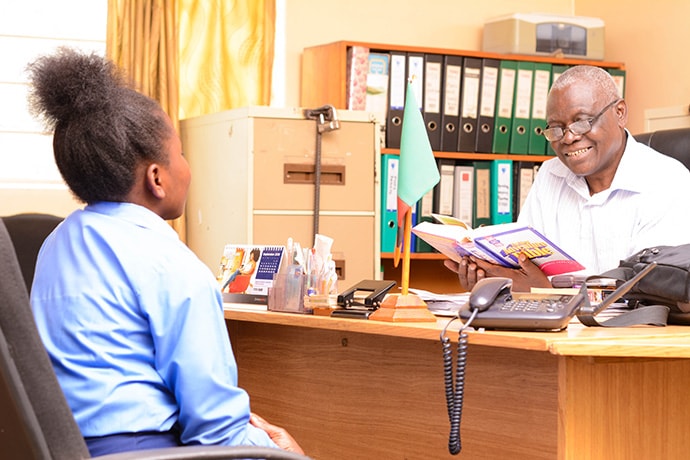
Robby Kangwa. Photo: ACE.
To help them achieve success, Kangwa’s vision is for all his students to graduate from secondary school with not only a diploma in hand, but also a trade or technical certificate, with an emphasis on entrepreneurship. Because of Zambia’s high unemployment rate, he wants to empower students to be independent and create work for themselves and others. That’s why he’s begun setting up classrooms that will start by teaching home economics and hospitality skills. Eventually, he hopes to expand to fabric and fashion design as well as computer repair.
When Kangwa first met the small girl with a math book, he never expected that he would end up as a head teacher, or working in the district office, or even running ACE’s education program.
“My passion was always teaching, helping children become better than me,” says Kangwa.
Although his dream took him further than he ever imagined, it’s safe to say he continues to fulfill that passion every day.
Welcome New Members
Please welcome our newest Global Washington members. Take a moment to familiarize yourself with their work and consider opportunities for support and collaboration!
Andrew W. Lyon Travel
Andrew W. Lyon Travel elevates your travel experience: organizing group logistics, crafting unique experiences, and connecting you to the world. Andrew W. Lyon Travel helps nonprofits with logistics, expenses, fund raising, and other top tier services for trip planning. andrewwlyon.com
Member Events
April 22 – May 22: Seattle Rep: Selling Kabul (Keep an eye out for a special GlobalWA member rate!)
April 26, 9:00 am PST: Doing Good with Data: Visualizing Impact and Risk in FSC Certified Forests
April 28, 10:30 am PST: The Crisis in Ukraine and the Impact of OutRight’s Ukraine Fund
May 9 – May 13: Catalyst 2030: Catalyzing Change Week
May 12, 7:00am PST: Women’s Link Worldwide: Why Digital Rights are Reproductive Rights
May 17 – May 18: Salesforce Nonprofit Summit
May 18 – May 20: Washington State Nonprofit Conference
May 30 – June 2: World Justice Forum 2022
June 6: OutRight Action International: Celebration of Courage Gala
Career Center
Donor Relations Intern, Alliance for Children Everywhere
Creative Marketing Intern, Alliance for Children Everywhere
Conference Planner and Coordinator – Project Emerald, Operation Snow Leopard
Development Director, Snow Leopard Trust
Senior Manager, Business Development, Splash
FSC I&P Corporate and Foundation Development Manager, Forest Stewardship Council
Associate, GoodCitizen
Check out the GlobalWA Job Board for the latest openings.
GlobalWA Events
April 28: Global Quality Education to Advance Gender Equality
SAVE THE DATE – December 8, 2022: Goalmakers Conference